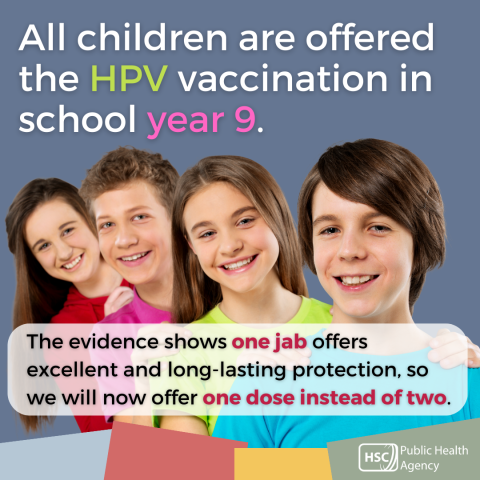HPV vaccination programme moves to single dose from September 2023

The Public Health Agency (PHA) is reminding parents of children who will be entering year 9 in September that they will be offered the human papillomavirus (HPV) vaccine during the first school term. This year teenagers will only require a single HPV jab, following updated advice from Joint Committee on Vaccination and Immunisation (JCVI).
The change reflects evidence building up over recent years from a range of studies from around the world that shows that a single dose of the HPV vaccine offers robust protection that is comparable to two doses. Based on the evidence, other countries, such as Australia and Scotland, have already made the move to one dose.
The HPV vaccine helps to prevent HPV-related cancers from developing in young people. While most types of HPV are harmless, some high-risk types can lead to the development of cancers, including cervical cancer, cancers of the head and neck (mouth and throat) and cancers of the anus and genital areas.
The HPV vaccine was first introduced in 2008 and was initially offered only to girls aged 12-13 years. In April 2019, the Department of Health announced that the vaccine would be offered to all young people in year 9 going forward as there was clear evidence that the HPV vaccine helps protect from HPV infection and associated cancers.
Louise Flanagan, Consultant in Public Health at the PHA, said: “The HPV vaccination programme is one of the most successful vaccination programmes in the world and has dramatically lowered the rates of cervical cancer and harmful infections preventing many cancers and saving lives.
“The latest evidence shows that one dose provides protection as robust as two doses. This is excellent news for young people.
“The HPV vaccine will help protect your child against HPV infection and associated cancers, including over 90% of cervical cancers in women, and cancers of the mouth, throat, anus and genitals in men and women.
“The vaccine is offered as part of the school-based vaccination programme. It is given in the same way as many other vaccines through an injection in the upper arm. The body reacts by making antibodies that will help the immune system fight HPV infection. The vaccine cannot cause HPV infection or cancer.
“HPV is very common and is easily spread through sexual activity. Although it is unlikely that your child is at risk of HPV infection at this age, it is recommended that they have the vaccine now because studies show that protection from the vaccine is better when it is given at an earlier age before they are exposed to the virus.
“Eligible individuals who started their HPV vaccination schedule last year and have already received one dose of the vaccine by September 2023 will now be considered fully vaccinated. If your child missed their first dose of the HPV vaccine, it is vital you get them protected. Contact your HSC Trust school nursing team or GP practice to arrange an appointment – your child will remain eligible to receive the vaccine until their 25th birthday.”
Parents will receive information about the vaccine over coming weeks and when the vaccination programme commences in their child’s school.
If parents have any questions about the vaccine, they can find more information on the PHA website The HPV vaccine: Questions and answers for parents of all young people aged 12-13 | HSC Public Health Agency (hscni.net) or they can contact their HSC Trust school nursing team directly when school starts again.
Louise continued: “During the summer break I would urge all parents or guardians to talk to their children about the importance of getting the vaccine and ensure that those eligible return their consent forms to the school and get the vaccine when offered during the forthcoming school year.”
From September 2023:
- Routine adolescent HPV immunisation programme for all children in school year 9 (aged 12 to 13 years) will move from two doses to one dose, offered mainly in secondary schools – this includes children not in mainstream school via a community clinic delivery model.
- Catch-up: eligible individuals who started their HPV vaccination schedule and have already received one dose of the vaccine by September 2023 will be considered fully vaccinated – those who missed out on their one dose HPV vaccine can catch up until their 25th birthday via their GP practice.
Also:
- Eligible gay, bisexual, and other men who have sex with men (GBMSM) under the age of 25 will move from two doses to one dose, offered through sexual health clinics.
- Eligible GBMSM aged 25 to 45 years will remain on a two-dose schedule, offered through sexual health clinics.
- Eligible individuals who are immunosuppressed or those known to be HIV-positive will remain on a three-dose schedule.
Further reading:
- The Joint Committee on Vaccination and Immunisation (JCVI) reviewed evidence gathered over several years and ran a public consultation, with their final advice to health ministers on changes to the programme published in August 2022.
- Similarly, the World Health Organization (WHO)’s Strategic Advisory Group of Experts on Immunisation (SAGE) published a review in April 2022 which concluded that a single-dose of HPV vaccine ‘delivers solid protection against HPV’ that is comparable to a two-dose schedule.
- The reviews also concluded that immunocompromised individuals, including those who are HIV positive, should continue to receive three doses as there is limited evidence regarding the efficacy of a single dose in this group.
- A study published in The Lancet in 2021 found that cervical cancer rates were 87% lower in young women who had been eligible for HPV vaccination when they were aged 12 to 13 years, compared to young women who had not been offered vaccination, providing strong evidence the programme is preventing cervical cancers. Overall, the study estimated that the HPV programme had prevented about 450 cancers and 17,200 pre-cancers up to mid-2019.
